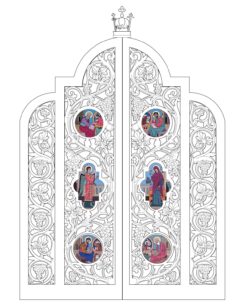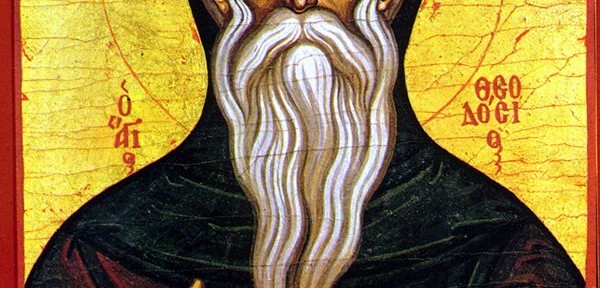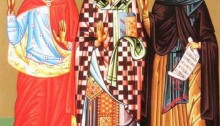Theodosius was the first founder and organizer of the cenobitic way of monastic life. He was born in the province of Cappadocia in the village of Mogarissus of devout parents. As a child, he visited St. Simeon the Stylite who blessed him and prophesied great and spiritual honors about him. With a thurible [censer] in which he placed unburned charcoal and incense, Theodosius sought out a place where he could settle and establish his monastery and stopped when the charcoal fired up on its own. Here, he settled and began to live the ascetical life. Soon, he gathered around him many monks of various nationalities. He built a church for each nationality so that, at the same time, services and hymns were offered to God in Greek, Armenian, Georgian, etc. But, on the day of Holy Communion, all the brotherhood gathered in the great church in which the Greek language was used. There was a communal table for all, communal property, communal penance, communal labor, communal patience and, not too rare, communal hunger. Theodosius was an exalted model of life to all the monks; an example in labor, prayer, fasting, watchfulness and in all Christian virtues. God granted him the gift of working miracles by which he was able to heal the sick, to appear from a distance, to tame wild beasts, to discern the future and to cause bread and wheat to multiply. Prayer was on his lips day and night. He died peacefully in the Lord in the year 529 A.D., the one-hundred fifth year after his birth. (Prologue of Ohrid) Continue reading January 11, 2014 Our Venerable Father Theodosius, Founder of the Ceneobitic Life
Continue reading January 11, 2014 Our Venerable Father Theodosius, Founder of the Ceneobitic Life
Day: 9 December 2013
January 6, 2014 The Holy Theophany of our Lord, God and Saviour Jesus Christ
When our Lord reached thirty years from His physical birth, He began His teaching and salvific work. He Himself signified this “beginning of the beginning” by His baptism in the Jordan river. St. Cyril of Jerusalem says, ” The beginning of the world – water; the beginning of the Good News – Jordan.” At the time of the baptism of the Lord in water, that mystery was declared to the world: that mystery which was prophesied in the Old Testament; the mystery about which in ancient Egypt and India was only fabled; i.e., the mystery of the Divine Holy Trinity. The Father was revealed to the sense of hearing; the Spirit was revealed to the sense of sight, and in addition to these, the Son was revealed to the sense of touch. The Father uttered His witness about the Son, the Son was baptized in the water, and the Holy Spirit in the form of a dove hovered above the water. When John the Baptist witnessed and said about Christ, “Behold, the Lamb of God, Who takes away the sins of the world”
(St. John 1:29), and when John immersed and baptized the Lord in the Jordan, the mission of Christ in the world and the path of our salvation was shown. That is to say: The Lord took upon Himself the sins of mankind and died under them [immersion] and became alive again [the coming out of the water]; and we must die as the old sinful man and become alive again as cleansed, renewed and regenerated. This is the Savior and this is the path of salvation. The Feast of the Epiphany [Theophany in Greek] is also called the Feast of Illumination. For us, the event in the Jordan river illuminates, by manifesting to us God as Trinity, consubstantial and undivided. That is one way. And, the second: everyone of us through baptism in water is illumined by this, that we become adopted by the Father of Lights through the merits of the Son and the power of the Holy Spirit. (Prologue of Ohrid) Continue reading January 6, 2014 The Holy Theophany of our Lord, God and Saviour Jesus Christ
Continue reading January 6, 2014 The Holy Theophany of our Lord, God and Saviour Jesus Christ
January 5, 2014 Sunday before Theophany, Octoechos Tone 8 Holy Martyrs Theopemptus and Theona Venerable Woman Syncletica
When Diocletian began his persecution of the Christians, Theopempos, Bishop of Nicomedia, was among the first to suffer martyrdom for Christ. Theopempos was brought before the emperor who threatened him with punishment of death if he did not deny Christ. To that threat, the courageous bishop responded to the emperor: “It stands written, `Do not be afraid of those who kill the body’ (St. Luke 12:4), `but cannot kill the soul’ (St. Matthew 10:28). O Emperor, you have authority over my body; do with it what pleases you.” Theopempos was severely beaten, suffered from hunger and tortured in various ways. Finally, the emperor summoned a certain magician, Theonas by name, to outwit this godly man through magic. Theonas dissolved the most potent poison in water and gave it to Theopempos to drink. Theopempos traced the sign of the cross over the glass and drank the poison. Theonas, upon seeing that the poison had no effect on Theopempos, turned to the emperor and shouted, ” I, too, am a Christian and bow down before the Crucified One.” Both were sentenced to death in the year 298 A.D.; Theopempos was beheaded and Theonas was buried alive. They honorably suffered and became citizens of the Kingdom of Christ. (Prologue of Ohrid) Continue reading January 5, 2014 Sunday before Theophany, Octoechos Tone 8 Holy Martyrs Theopemptus and Theona Venerable Woman Syncletica
Continue reading January 5, 2014 Sunday before Theophany, Octoechos Tone 8 Holy Martyrs Theopemptus and Theona Venerable Woman Syncletica


